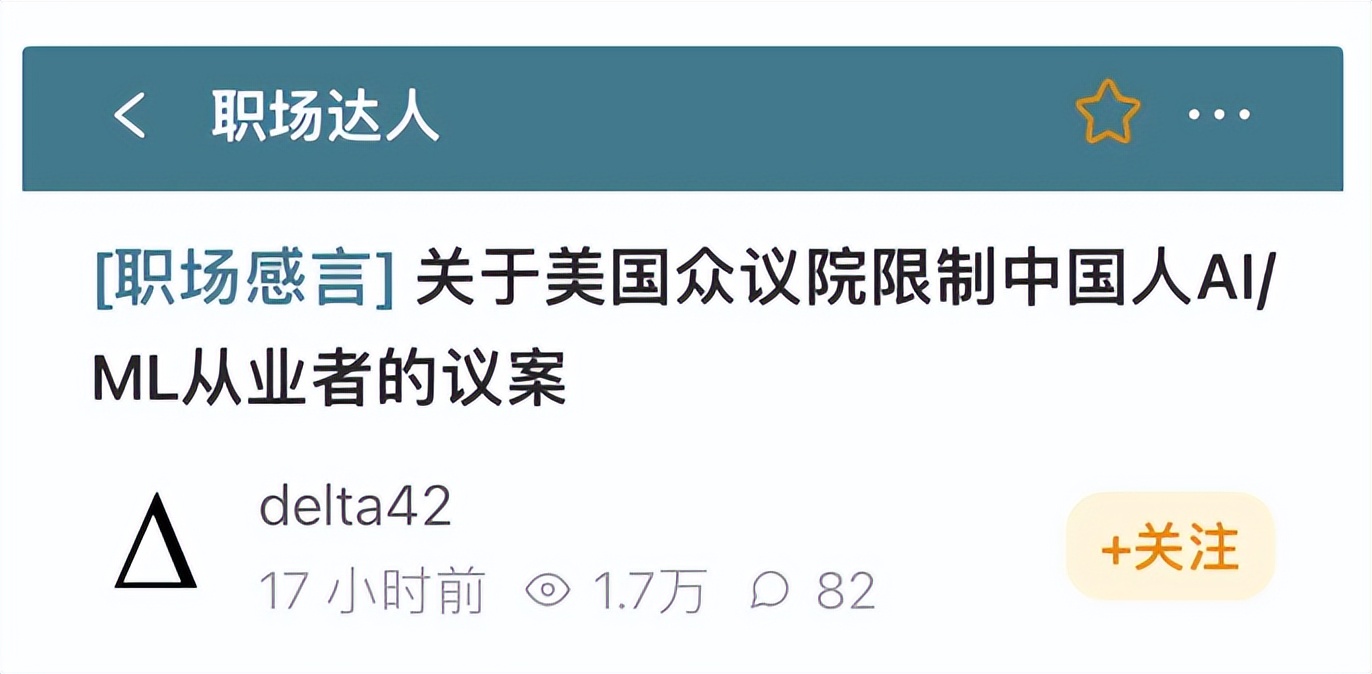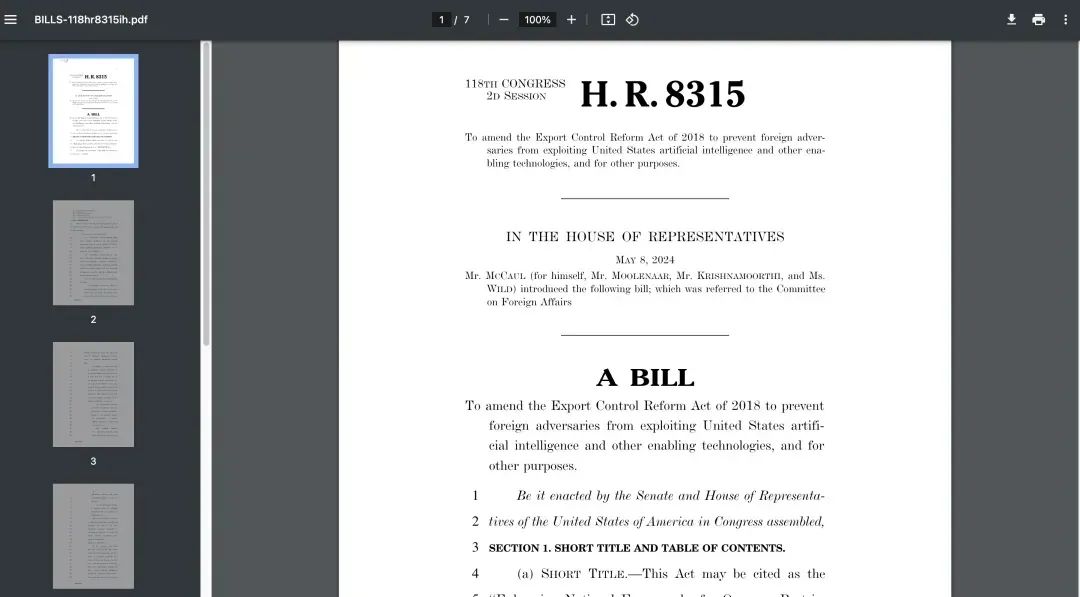On Saturday, a user posted on Yimusanfendi:USAThe House of Representatives restricts Chinese AI/ML practitionersmotion》

▲The picture comes from the Yimu Sanfendi APP. The copyright belongs to the original author.
The following is part of the post:
@delta42
On the 8th of this month, the House of Representatives proposed the "Enhancing National Frameworks for Overseas Restriction of Critical Exports Act" (ENFORCE), which aims to restrict the transfer of important AI/ML technologies to China. I took a quick look at the bill and it doesn't look good at the moment. Here are a few key points:
- If the bill is passed, Chinese H1b holders may need special permission to do AI/ML related work.
- The target has been clearly identified as the Chinese people.
- The bill has bipartisan support. Among the bill cosponsors, there are two California congressmen, both from LA. It is likely to be passed in the future.
- The scope of regulation is very vague. It is generally said that it is an AI system involving national security, including both software and hardware. What is clearly pointed out is model weights. If it is passed, it may be more difficult for H1b holders to continue to do model training. Those who do AI infra may also be affected. I don’t know if it will lead to NVDA restricting H1b for Chinese people in the future. The bill recognizes that open source projects are difficult to define and we need to wait for future details.
- Because it is an extension of the previous exports control, those who have cards should not be subject to restrictions. But we should not take it lightly. This ACT attempts to give the president and relevant departments more power to regulate the cooperation between US persons (including green card holders) and Chinese companies in AI.
- In general, it is not a good thing. I personally think that it is very likely to pass. On the one hand, bills related to China and national security are easy to pass. On the other hand, unlike the ban on TikTok, American people do not care and may even be happy to see it happen. With such a bad job market, it is always good for us to have fewer Chinese H1b holders competing with us for ML/AI jobs.
Hopefully the bill will not pass in the end 🙏
Later, LZ added:
Many friends in this thread are asking about the specific impact if the bill is passed. For this question, you can search for "export control license" in the forum. Applying for this license is actually a common problem for hardware engineers in the chip/semiconductor industry before they join the company for many years. This ENFORCE ACT is intended to expand the scope of previous controls. Simply put, positions involving AI/ML may need to apply for this license, and it may be difficult to pass if the information is too core and confidential. As for how strong the company's willingness to apply for H1b positions is, and how willing it is to consider Chinese people, it depends on the employer.
User @小亩_5634337 helped everyone find the PDF file URL of the proposal:
https://www.congress.gov/118/bills/hr8315/BILLS-118hr8315ih.pdf
⬆️For everyone to copy the link and read it.

▲The screenshots are from the Internet and the copyright belongs to the original author
Everyone expressed their opinions on this matter:
@Anonymous User-LLZW1
It feels like the overall market trend in the United States is moving towards a "closed-door" approach:
TikTok has a clear advantage in the US market, so the country has resorted to state-level means to force it to buy it, otherwise it will be driven out of the US market;
Chinese electric vehicles have obvious advantages over American car companies, so they resort to national measures, such as imposing tariffs and issuing protectionist policies. If that doesn’t work, they will continue to impose tariffs.
Now people are proposing to restrict Chinese people from entering AI-related jobs.
I can’t imagine what’s coming next...
@fsi206914
I am speechless. . Just ban the AI/ML open courses of Harvard, Yale, and Pearce. Andrew Ng and others should be much more helpful to the AI/ML industry in mainland China than H1B holders.
@salinsun
What are these congressmen thinking? If AI systems are included in US export controls, the US will definitely suffer the most and China will definitely benefit the most. There are so many people studying AI in China. If the US restricts Chinese AI students from going to the US, and everyone returns to China to do AI, what good will it do to the US? These US congressmen will be a great help.
I suggest that all F1 and H1B people in the US who are looking for AI and MLE jobs write to their local congressmen, or even to the members of the above group, to complain that this bill is not in the national interest of the United States.
@Anonymous user-2VNRY replied: In the future, the United States may not allow Chinese students to study AI in the United States.
@salinsun continued answer⬇️
Not allowing Chinese students to study AI in the United States will be a huge negative for American interests in the short term, and it is hard to say in the long term, but it will definitely not be a good thing for the United States.
In the short term, a large number of Chinese people working in AI are forced to return to China, bringing with them the knowledge they have just learned in schools and work in the United States, directly contributing to the development of domestic AI. Although this will lead to increased employment pressure in China, China's electric vehicle industry and photovoltaic industry have all developed in this way. There are so many Chinese people in OpenAI (although they should all have status, those with status should have obtained EB1A during their PhD period)
In the long run, I don’t know if the domestic environment can foster the next OpenAI, but with so many people returning, so many college graduates in China, so many LLM startups, plus their students and mentees, it is possible that the next OpenAI will be born in China.
@greencat
Real AI talents can easily get their green cards through NIW and EB1A, and are not subject to this restriction at all!